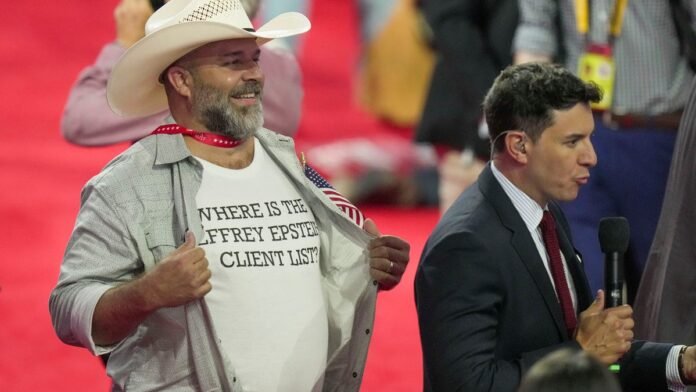
What the Epstein files reveal and Trump’s response
President Trump has pushed for more disclosure around Epstein’s case after many have demanded the release of a so-called “client list.”
Congress last week handed over the power of the purse to President Donald Trump without even a thank-you-for-your-service in return as the Supreme Court cleared the way for him to slash the workforce at the Education Department and, presumably, elsewhere.
So why isn’t the president smiling?
Answer: Jeffrey Epstein.
After continuing to amass unprecedented power in the White House, steamrolling a compliant Congress and being nominated for the Nobel Peace Prize by world leaders more eager to flatter than confront him, Trump finds himself flummoxed by the case of a disgraced financier who died in a jail cell six years ago.
Epstein’s ghost is beginning to haunt the White House.
The very tools that helped win Trump two terms − the openness to conspiracy, the distrust of elites, the eruption of a viral moment − have now turned to bedevil him.
In this case, the assertion this month by the Justice Department and the FBI that the Epstein case was over and done with was met by derision and disbelief among some of the president’s most loyal supporters. After all, such influential MAGA voices as Tucker Carlson and Steve Bannon had been insisting for years that Epstein’s suicide was suspicious and his powerful associates hidden.
A week ago, Trump told his supporters to “not waste Time and Energy on Jeffrey Epstein, somebody that nobody cares about.” He followed up by denouncing his supporters who were upset with the case as “weaklings” who had “bought into this bulls***, hook, line and sinker.”
Those instructions didn’t sway many in his political base.
Then he directed Attorney General Pam Bondi to release the investigation’s grand-jury testimony, a step that can only be ordered by a judge.
Now Trump has filed a lawsuit for libel and slander against the Wall Street Journal, its publisher, two of its reporters, and News Corp founder and former friend Rupert Murdoch. At issue is its story that Trump sent a “bawdy” 50th-birthday letter to Epstein in 2003, decorated with a crude drawing of a woman’s naked body that used his distinctive signature to suggest pubic hair.
“Happy Birthday − and may every day be another wonderful secret,” it reportedly said.
Trump called the article “false” and demanded damages “not to be less than $10 billion.”
But he acknowledged on the social-media platform Truth Social that the release of grand-jury testimony isn’t likely to settle things. [N]othing will be good enough for the troublemakers and radical left lunatics making the request,” he railed. “It will always be more, more, more. MAGA!”
A furor that swamps Medicaid cuts and Elmo’s future
A purported “Epstein client list” and the dark suspicion that powerful people are being protected has created a political firestorm stronger than the prospect of cutting an estimated 12 million people off Medicaid or the proposal to end federal funding for Elmo.
The cuts in health care for the poor were part of the “Big Beautiful Bill” that Congress passed July 3 −, extending Trump’s first-term tax cuts, increasing spending on border security and slashing funds for Medicaid, food stamps and green energy.
On Friday, July 18, Congress approved $9 billion in spending cuts in foreign aid and public broadcasting, Muppets included. The so-called recission package deleted funding Congress had previously approved and reflected the Capitol’s voluntary retreat from its constitutional power to decide how tax money should be spent.
In the past, the tactic has rarely succeeded. In the future, the White House budget office said more such cuts would be on their way.
But that consequential debate got less ink and fueled less furor than the Epstein saga.
Trump’s attempt to convince Americans that there is nothing to see here is likely to be an uphill battle. In a Reuters/Ipsos Poll, 69% of Americans said they thought the federal government was hiding details about Epstein’s clients. Only 6% said information wasn’t being hidden. The rest weren’t sure.
The poll, taken July 15-16, has a margin of error of plus or minus 3% for all adults and 6% for subgroups.
Those who see a conspiracy afoot included a 55% majority of Republicans. Only about a third of those in the GOP, 35%, approved of how Trump is handling the issue. Overall, just 17% approved, his lowest rating on any issue.
The long lifespans of conspiracy theories
One lesson of Trump’s political career is this: Once you’ve persuaded people there’s fire behind the smoke, it’s hard to convince them that the air has been cleared.
When Barack Obama ran for the White House in 2008, Trump repeated debunked allegations that the Illinois senator had been born in Kenya and wasn’t eligible to be elected president. After Obama had served two terms in the White House, a Morning Consult poll found a third of Republicans still believed that falsehood.
Since the 2020 election that Trump lost, he has repeated disproven allegations that the election was rigged against him. When the 2024 campaign was getting underway, a CNN poll found that 69% of Republicans and those who “leaned” to the GOP believed Joe Biden’s win wasn’t legitimate, that the election had been stolen.
And Epstein? Welcome or not, he may be sticking around for a while.
